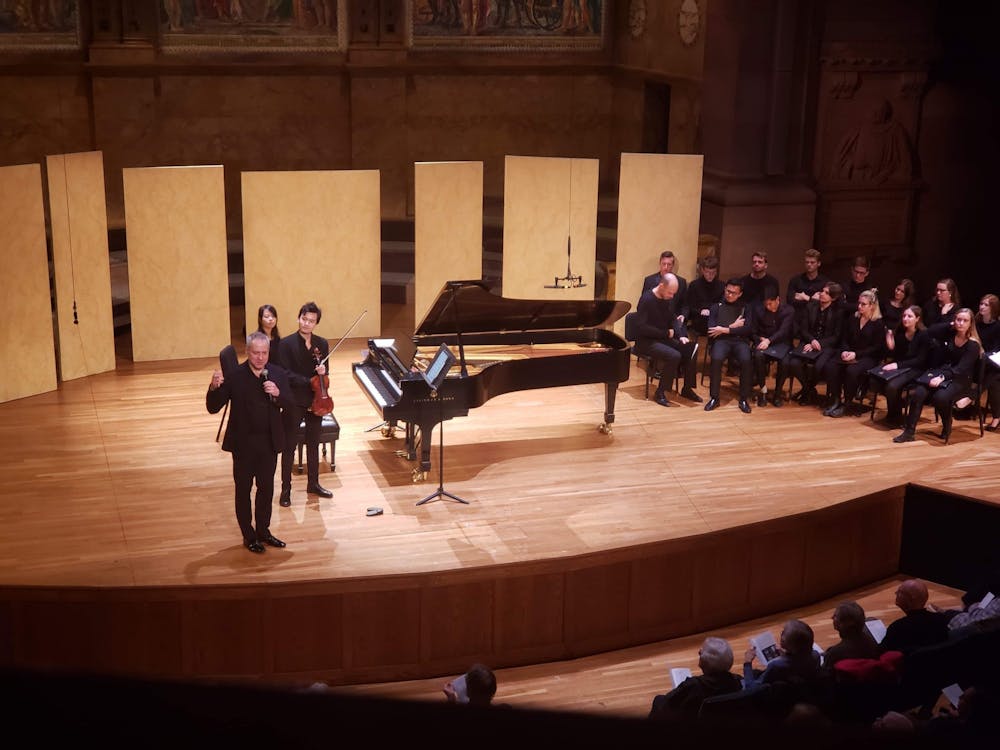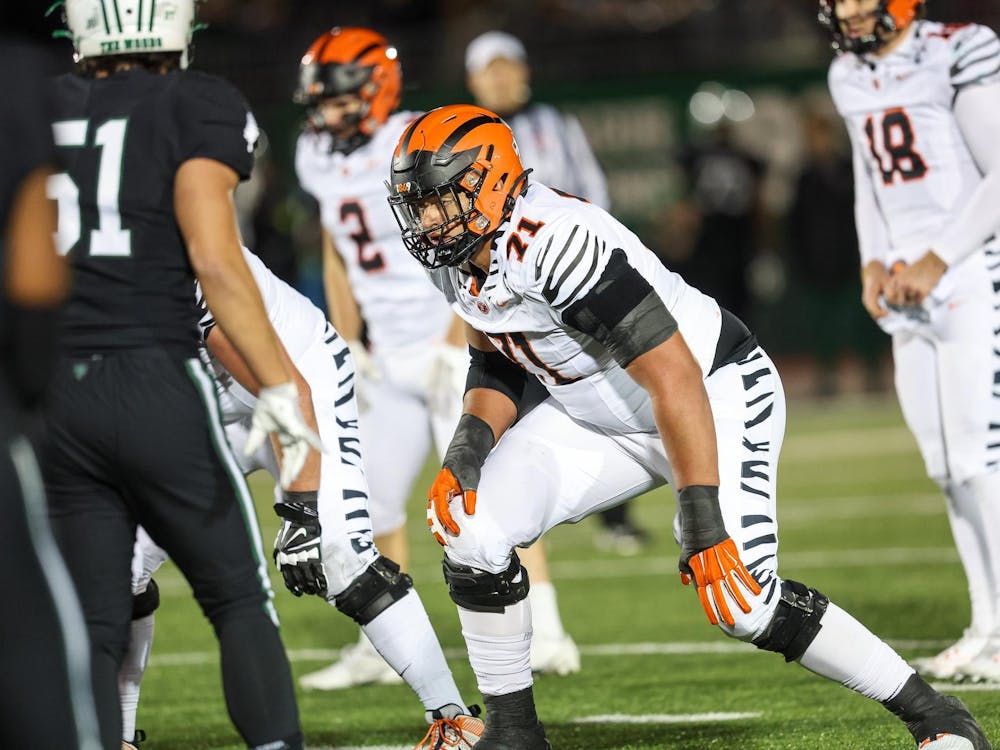On Thursday afternoon, violinist Stefan Jackiw and pianist Jeremy Denk walked silently onto the stage of Richardson Auditorium, weaving between folding chairs and close-eyed patrons already deep in a meditative state. Eight hours later, the pair would enter the same stage to thunderous applause, Jackiw’s gray sweater and tousled hair traded for concert black, audience shifted to the balcony and ground.
Jackiw and Denk came as part of Princeton University Concerts’ 126th season, offering two unique performances. On Thursday night, the longtime duo revived a program of Charles Ives’ four rarely performed violin sonatas, a concert that has attracted acclaim across the country. Ives is perhaps best known for his sometimes polarizing unorthodoxy, for pieces that challenge both musician and audience, and for frequent associations with the words “daring” and “raucous.”
In the middle of the day, the hall was transfixed in a calm, which betrayed little of the impending raucousness. Jackiw and Denk bowed their heads for several minutes of saturating quiet, curating an intimacy and intentionality.
In an interview with The Daily Princetonian, Jackiw described performance as an opportunity to “come together in some quasi-religious way, [to] take communion together through this piece.”
With the live music meditation — part of a series of University concerts — Jackiw and Denk sought to capture this cathartic spirituality of performance. A work by Clara Schumann flowed with meditative composure, but the performers also borrowed from Ives from the later program in a way that alluded to his work’s complex and, at times, arresting allure. Jackiw reflected on the incorporation of dissonance into meditation, highlighting the nuanced coexistence of beauty and serenity with tension.
A half hour later, the music faded back to silence and to the grips of reality, broken only by the ringing of a bell and an announcement that “you have permission to clap.”
If not a violinist, Jackiw might become an actor, which he views similarly to an instrumentalist.
“You’re taking someone else’s — whether the composer or the playwright — written work and bringing it to life on stage,” Jackiw said. “Filling it with your own personality and your own take on the work.”
To Jackiw, embodying this “emotional world” of a piece is the core and content of performance, transforming a beautiful but empty portrayal into a vulnerable retelling of the composer’s story. If not acting, Jackiw might also pick psychiatry as a secondary career.
“I’m really interested in why we are the way we are. The emotional baggage, and the emotional influences that we carry with us,” Jackiw said. “Music is an exploration of the human condition as is studying about the human mind.”
In performing the Ives sonatas, Denk and Jackiw sought to inhabit a deeply emotional journey fraught with complicated technique and disparate melodic musings.
“Pretend you’re a madman genius riffing on a hymn or a ragtime,” Denk wrote in the program. “Then, hopefully, maybe, you as the audience can understand the whole thing, too, the way the hymns are constantly being changed, made funnier or more solemn, shifted into various personalities and styles — all setting up a final epiphany.”

The musicians played Ives’ four sonatas from last to first, broadly in order of complexity. Interspersed with Ives’ works were the childhood hymns and tunes that inspired and shaped his compositions, performed by student members of the Glee Club.

Jackiw plays along with TCHS orchestra students
Photo Courtesy of Lou Chen ’19, Princeton Department of Music Program Manager for Arts Outreach
“For the audience members and also for me as a performer, having these hymns sung sort of sets a tone, brings us back to that early-20th-century New England setting that Ives was in and grew up in,” Jackiw said. “It sets an ambiance for the concert which I think is really nice.”
From the first notes of the performance, from Jackiw’s bobbing head in the breaths before his entrance, the musicians acted in unison. Jackiw described the partnership as operating on a single wavelength, avoiding the pitfalls of overly didactic playing.
“Each time I come back to these pieces, the denseness and thorniness of them seems less daunting and I discover new depth of nostalgia and remembrance,” Jackiw said. “I love the pieces more and more every time I play them, I find them more and more touching and kind of universal.”
Lou Chen ’19, director of the Trenton Youth Orchestra and the Princeton Department of Music’s Program Manager for Arts Outreach, was hearing the sonatas for the first time.
“It was a very, I think, ambitious and unique program — you don't often hear Ives performed at all, let alone his violin sonatas,” Chen said. “They were the perfect duo to pull it off.”
Throughout the performance, Denk took moments to lean back slightly and look over his shoulder at Jackiw, sometimes for less than a beat. These connections occurred even when Jackiw’s back was to the piano, when his eyes were closed, when he stood quietly during a rest. For Jackiw, much emotional burden was carried in his eyebrows. Even without listening, audience members could track the ideological progress of the third sonata’s final movement through Jackiw’s furrowed brow, lifting into a somber expression with the final arrival of the heartbreakingly sweet hymn.
In his narration during the concert, Denk asked the audience to consider Ives’ sonatas in the context of what it means to be an American, as a “portrait of the composer” quoting from the music of his youth. The energetic and passionate performance animated Ives’ story and compositions, likely imparting a newfound appreciation amongst much of the audience.
“When I saw Jackiw play at the concert it felt like he was telling us a story,” said Jennifer Pinto, a first-year violinist at Trenton Community High School who attended the Ives concert. “It felt like he was expressing his emotions through the violin.”
As part of the Princeton University Concerts new outreach program, Jackiw also took time to visit students from the TCHS orchestra. The outreach program grew out of last year’s residency with Maestro Gustavo Dudamel and the support of the Gustavo Dudamel Foundation. The program will continue sending guest artists to work with Trenton students over the course of the year.
“For developing young musicians, to see someone like Stefan perform is I think both intimidating in that they think to themselves, ‘I could never get that good,’ but also, in a paradoxical way, truly invigorating,” Chen said.
Jackiw played for and performed with the orchestra, answered questions, and talked about his own experiences. Shorn of the stage and applause, Chen said Jackiw’s casual presence helped to allay the sometimes isolating professionalism of classical music.
“I loved both days I saw him,” said Perla Diaz, also a freshman violinist at TCHS. “It helped me to see him perform because the more I see, the more I learn and the more inspired I get — I hope someday I’ll get to be just like him, or even better.”
During Jackiw and Denk’s live music meditation, Jackiw talked about the relationship between calm and tension, between beauty and dissonance. In the quiet, communal hall on a Thursday afternoon, detached from the bustle of work and class, both the message and the catharsis of the music proved resonant.








